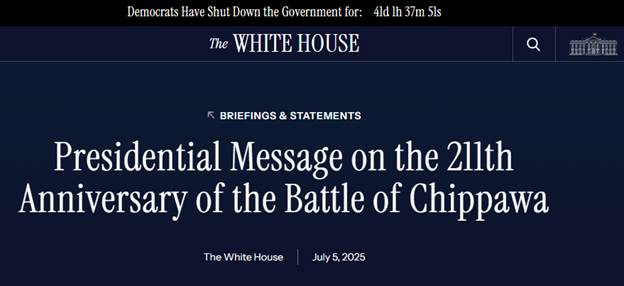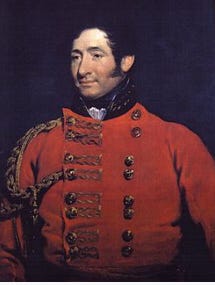“Those are regulars, by God!”
The White House itself explains why it should lose the National Guard litigation, but what comes next may be worse.
In litigation arising out of President Trump’s orders to deploy National Guard troops in California, Oregon, and Illinois, judges are evaluating whether the President had statutory authority to call the Guard into federal service. The National Guard is a hybrid entity that operates under the command of a State’s governor unless the President “federalizes” the Guard. The President cannot take command of the Guard whenever he wants; he needs authorization from Congress. This post explains why the President’s own White House website, along with many other sources, show the President should lose the National Guard cases. If he does, however, he might invoke the Insurrection Act, which presents a whole new set of challenges for those who oppose deployment of troops in American cities.
The President never tried to enforce the law with the regular forces, so he cannot call the National Guard into federal service.
Under the statute at issue in the ongoing litigation, the President may take control the National Guard when he “is unable with the regular forces to execute the laws of the United States.” 10 U.S.C. § 12406 (my italics). In the lower courts, the States argued that no evidence shows the President was unable to enforce the law. But courts prefer not to decide evidentiary questions when the President’s authority to command troops turns on the answers to those questions. In the U.S. Supreme Court, a law professor, Martin Lederman, argued in an amicus brief that “the regular forces” means the active-duty military, and because the President had never attempted to use the military to carry out the law, he had not shown that he was unable to do so.
The meaning of the phrase “the regular forces” is not immediately apparent, at least for non-veteran non-historians, i.e., most lawyers. But sometimes the original meaning of a legal term is illuminated by a story from the past. As if to prove once again that we live in interesting times, as Lederman points out in a subsequent amicus brief, the White House website tells that very story, demonstrating why the States should prevail and the President should lose.
Beneath a banner and ticking clock counting the days that “Democrats Have Shut Down the Government,” the official White House website has a page for “Briefings & Statements.” Many statements pertain to historical events or ongoing litigation, and occasionally, both at the same time. In July, the White House published a “Presidential Message on the 211th Anniversary of the Battle of Chippawa.”
In the White House’s telling, at the Battle of Chippawa, “a seminal battle in the War of 1812, the true might of the United States Army was revealed in full glory ….” British General Phineas Riall had attacked American troops, believing them to be undisciplined state militiamen because they wore grey uniforms, while the full-time U.S. Army typically wore blue uniforms. But despite wearing militia grey, these Americans soldiers were not state militia; rather, they were regular U.S. Army forces. As the Americans beat back the British advance, General Riall cried out, “Those are regulars, by God!’” (Here’s a photo from Wikipedia entry on Riall.)
The story of Phineas Riall and his realization that his foe was the “regulars” supports the States because it tends to show that “regular forces” means the active-duty military. As explained in Lederman’s amicus briefs, the phrase “regular forces” had a particular meaning around the time of the founding, which has remained intact throughout relevant statutory iterations. The historical and contemporary evidence that “the regular forces” means the U.S. military is compelling (I’m leaving out all the other evidence to focus on the interesting historical story).
I speculated in a prior post that the States deliberately refrained from making this “regular forces” argument because they could win based on the meaning of the word “unable,” regardless of what “regular forces” means, and did not want to create any further incentive for the President to deploy active-duty armed forces in the United States. The idea was that it might be better for a court to say that it would review the President’s factual basis for sending troops into American cities than for a court to say that the President must send in the regular military forces first before turning to the National Guard for additional assistance.
In any event, after Professor Lederman raised the issue in his initial amicus brief, the Supreme Court ordered supplemental briefing. Left with no choice about whether to address Lederman’s interpretation, Illinois and California and Oregon have now backed it. My best guess is that the Court will side with the States, deny the President’s emergency stay application in Trump v. Illinois, and thus allow the injunction barring the deployment of federal troops in Illinois to remain in place.
If the President may not federalize the National Guard, can he send the regular forces to enforce immigration law in Los Angeles, Portland, and Chicago?
In contrast with the National Guard, the President has direct control over the active-duty military and, at least arguably, could deploy the military to guard federal facilities in the United States, so long as the military does not act as a “posse comitatus,” i.e., does not engage in law enforcement activities. The States of California and Oregon made that argument in their amicus brief in the U.S. Supreme Court, by way of explaining that Congress reasonably could provide that the President could use the military for tasks that are not associated with policing, such as delivering the mail and disaster relief.
But the President did use troops for law enforcement purposes in California, or so a federal judge determined. To bring the President’s past and intended law enforcement activities under the cover of statutory authorization, he would need to invoke the Insurrection Act (10 U.S.C. 252-253), which authorizes the use of both the regular military and the National Guard for law enforcement. This is why invoking the Insurrection Act is such a dramatic step.
It is no secret that the Insurrection Act might be construed to grant boundless discretion to the President to deploy the military in the United States. The Insurrection Act provides that “Whenever the President considers that unlawful obstructions, combinations, or assemblages, or rebellion against the authority of the United States, make it impracticable to enforce the laws [he may call the armed forces into service], as he considers necessary to enforce those laws or to suppress the rebellion.” 10 U.S.C. 252 (italics added). The word “considers” does not appear in the statute currently before the U.S. Supreme Court (10 U.S.C. 12406). Thus, the Insurrection Act arguably requires only that the President “considers” that conditions have occurred, not whether the conditions actually have occurred, leaving relatively little for a court to review.
In short, invoking the Insurrection Act to respond to political protests would be a dramatic escalation, precisely because it allows the military to conduct law enforcement activities and because key statutory language reduces the probability of judicial review on the merits. Thus, invoking the Act might have been too much to do in one step, even for a president who is not above norm-breaking. Federalizing the National Guard under 10 U.S.C. 12406 may be the first part in a calculated process of normalizing military presence. When the President invokes the Insurrection Act, it will not be the first time that he has sought to deploy troops on American soil.
But there would be a difference. Under the Insurrection Act, the military could make arrests and perhaps hold people in military detention centers pending trial. The primary defense against arbitrary detention would be individual rights under the U.S. Constitution. As the ACLU explained in its amicus brief in the Trump v. Illinois case, the government cannot take away First Amendment rights without a compelling need, and any such attempt should be subject to highest and strictest judicial scrutiny, not the most deferential. Instead of governors and States suing the administration, future lawsuits would involve individual citizens who got swept up in military law enforcement. These individuals will be able to assert their First, Fourth, and Fifth Amendment rights. And when asked who arrested them, if such a terrible moment comes to pass, their answer would be the same as Phineas Riall’s: the regulars, by God.


